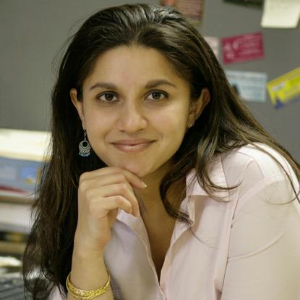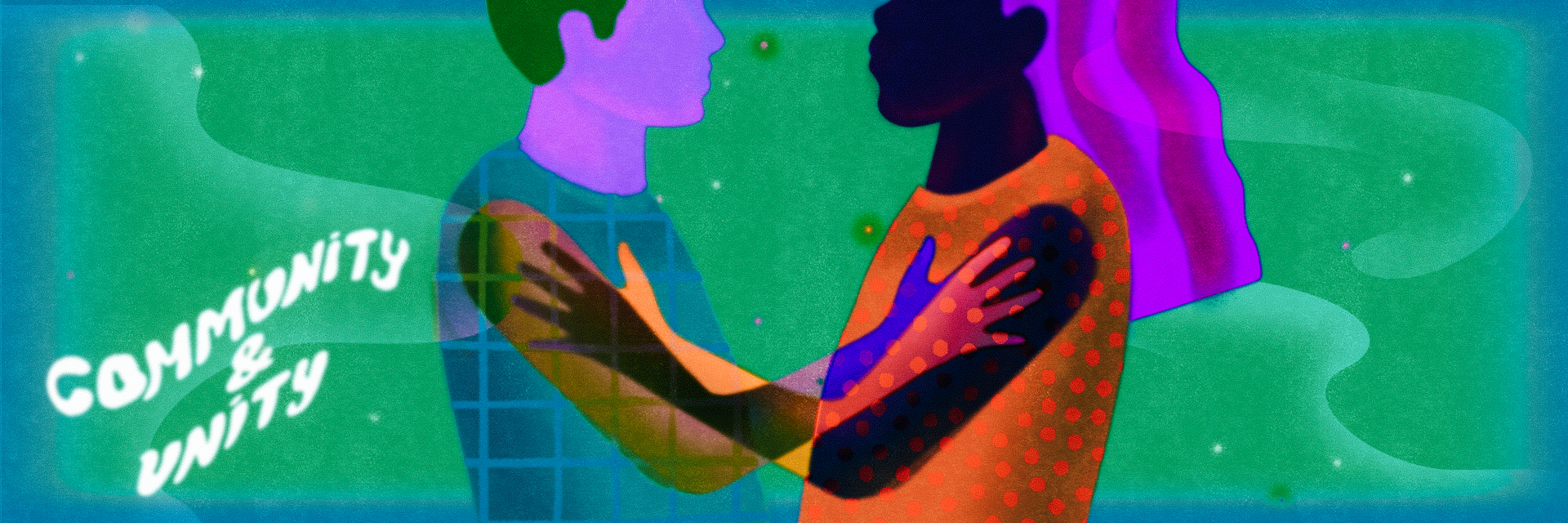
We Will Emerge: Community and Unity
We Will Emerge is a collaborative project bringing together 111 writers, activists, academics, poets, and public servants to imagine a blueprint for a post-COVID America. The pandemic has revealed how much we rely on one another. These submissions talk of community and unity, expressing a belief that we are all far more deeply connected than we know. Contributors for this section of We Will Emerge include Min Jin Lee, Lynn Nottage, and April Reign.
JUMP TO:
Judd Apatow | David Axelrod | Heather Berlin | Carla Blank | Jaswinder Bolina | Simone Campbell | Susan Carland | Rabia Chaudry | Val Demings | Negin Farsad | Kim Ghattas | Virginia Heffernan | Ishmael Hope | Rabbi Jill Jacobs | Min Jin Lee | Rev. Jacqui Lewis | David Lindsay-Abaire | Lynn Nottage | Naomi Shihab Nye | Edna O’Brien | April Reign | Zainab Salbi | Brandon Stosuy | Jake Tapper | Baratunde Thurston | Sarah Wildman | Rafia Zakaria
Judd Apatow
My dream is that we emerge and realize that we are all in this together. Problems can only be solved if we all join together to sacrifice, lift each other up, and to do the hard work necessary to change the world. Our president has preached America first and every man and woman for themselves. This type of selfishness will surely be the demise of the human race. Hopefully seeing an egomaniacal, materialistic, hateful man with virtually unlimited power has taught us all that we want the opposite. Egolessness. Selflessness. Service. Kindness. Sacrifice. Love.
Judd Apatow is the director of The King Of Staten Island and the documentary The Zen Diaries of Garry Shandling.
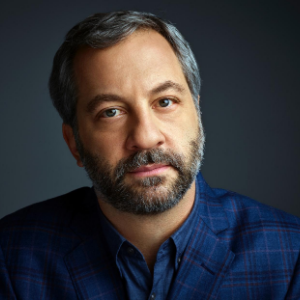
David Axelrod
We will emerge with a deeper sense of humanity and justice.
We’ve learned how easily we can infect even perfect strangers, or be infected by them. We’ve also relied on the generosity of countless everyday heroes to save us. We’ve confronted the painful, inescapable evidence of brutal injustice and been forced to ask, “What if that were my child?”
We will emerge and find a better way.
David Axelrod is a CNN Senior Political Commentator, host of “The Axe Files” and “Hacks on Tap” podcasts, and the director of the Institute of Politics at the University of Chicago.
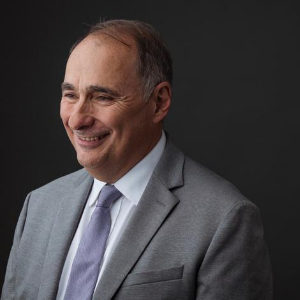
Heather Berlin
We will emerge and be more empathetic and connected.
No matter what your station in life, most of us have experienced some fear or anxiety around uncertainty (whether economic or health-related) during the current pandemic. Have you become afraid to touch a doorknob or a recently delivered box, or simply to leave the house? Have you felt panicked, isolated, hopeless, or depressed? Do intrusive, disturbing thoughts invade your mind throughout the day and (especially) at night?
These are feelings that many people with mental illness must contend with at the best of times. During the pandemic, many of these feelings have gained a rationale that the more debilitating and pathological forms seem to lack, but even now the degree of fear and anxiety we are experiencing can paralyze our ability to respond wisely to the crises. Will we emerge with greater understanding and empathy for chronic sufferers of anxiety and depression, and begin to treat them with more compassion and less stigma?
We are also learning that the physical and mental wellbeing of the weakest amongst us impacts all of our health. As Dr. Seuss observed: “A person’s a person no matter how small.”
Will our current feelings of solidarity and social integration carry forward, helping us to dissolve our imposing, narcissistic egos and experience humanity as one interconnected whole?
In the fight against coronavirus, we are all one, but this is only an acute example of a larger truth that we lose sight of at our peril once the current threat is lifted.
We will emerge and find a better way.
Dr. Heather Berlin is a cognitive neuroscientist and assistant clinical professor of psychiatry at the Icahn School of Medicine at Mount Sinai. She hosts StarTalk All-Stars with Neil DeGrasse Tyson, and has hosted TV series on PBS and the Discovery Channel.
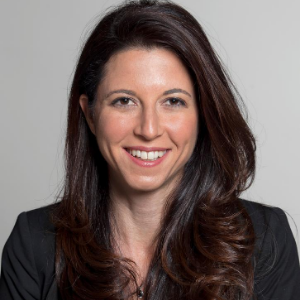

Carla Blank
We will emerge with the understanding of how profoundly our lives are dependent on and supported by everyone else, both near and far away.
A day-old cough across an elevator can kill us. A healthcare worker from another land can save our life. Sanitation workers, grocery clerks, and postal workers provide the comfort that life will go on. Pictures from space show that the air and oceans are cleaner, which indicate that measures to reverse global warming could be easier than we think. How much could earth benefit if we kept cars off the road one month each year, or practiced alternate driving days, according to the odd- or even-number ending on a license plate? A child sees the pandemic and decides she will become a doctor. Is her lesson that faced with disaster, human beings tend to cooperate? Will this lesson hold?
Carla Blank is author of Rediscovering America: The Making of Multicultural America, 1900-2000 and coauthor, with Tania Martin, of Storming the Old Boys’ Citadel: Two Pioneer Women Architects of Nineteenth Century North America. She directed productions of Wajahat Ali’s play, The Domestic Crusaders, from 2004 to 2011.
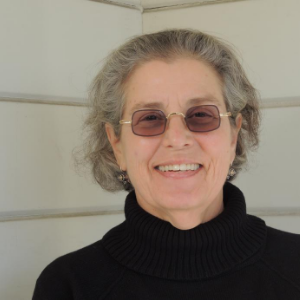
Jaswinder Bolina
We will emerge and be honest about how desperately we need each other. . .
. . . in the close spaces where we handshake and hug and press our cheeks together in greeting, where we potluck and picnic and pass spliffs around the bonfire, where we kiss our mothers hello and our children goodbye to school.
We will be honest in the local spaces where we desperately need each other, where we small talk on the escalator and flirt in the waiting room, where we might even have sex on a first date again someday, and all our shoulders are mashed together on the bus or in a pickup truck or in the packed backseat of a Lyft with the driver telling us his honest story of finding refuge in Cleveland from Pakistan or Cuba or Somalia.
We will be honest, in the wide spaces between Cuba and Cleveland, between Pakistan and Somalia, about how desperately we need each other, how just a puff of vapor from our mouths binds us across continents, how what happens to some of us happens to all of us, and when we are apart, nothing works right, and we will say this honestly and aloud and we will say it often, and if anybody doesn’t believe it, we will emerge and find a better way.
Jaswinder Bolina is author of the essay collection Of Color. He has previously published three full-length poetry collections, The 44th of July, Phantom Camera, and Carrier Wave, and a digital chapbook, The Tallest Building in America.
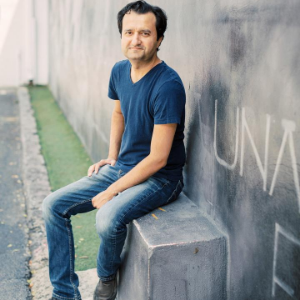
Simone Campbell
We can’t breathe!
We are crippled by the two
Diseases of COVID and racism.
We can’t breathe!
But today I find a flicker
of hope that we will engage
this crippling reality and commit
to ending white supremacy,
police brutality,
viruses running rampant.
We wear masks for COVID and
unmask discrimination.
We will not hide from anguish.
We will engage.
We will change!
Because of that:
WE WILL EMERGE with reverence!
Blinking into daylight,
Quivering quietly in crowds,
Knowing the treasure of face
to face without a screen between.
Will we speak more slowly
having accommodated to digital delay?
We will emerge
With a treasured interdependence,
A residual Braille of connectivity
A sense of global oneness, shared solidarity.
Then and only then
will we be able to breathe.
Sister Simone Campbell, SSS, is the executive director of NETWORK Lobby for Catholic Social Justice and leader of Nuns on the Bus. She has led six cross-country Nuns on the Bus tours focused on tax justice, healthcare, immigration reform, voter turnout, and mending the gaps in income and wealth inequality.
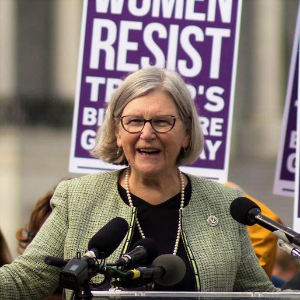

Susan Carland
We will emerge and connect.
Before COVID, we were on a one-way journey to complete immersion in our screens. We withdrew more and more from real interactions with people, instead preferring to sit alone on our couches, texting and scrolling. We ordered food on apps instead of entering restaurants and streamed shows on our phones instead of going to live events or the cinema. Even our dating lives had been largely digitized. None of this made us happy, but we continued.
With COVID, we relied on our devices even more, Zooming every social and business interaction. And surprisingly, we felt exhausted, frustrated, and disconnected. At the end of each day, our children looked tranquilized. We were like zombies.
We had full digital immersion for a few months and realized what a bankrupt existence it was.
When we can reenter society and each other’s embrace, we will know—really know—this is what our humanity is predicated on.
I can only hope our phones and iPads will gather dust. Our social media will not be updated. Our email will not be checked 20 times a day. We will look each other in the eye, and stay there.
We will emerge and find a better way.
Dr. Susan Carland is an academic at Monash University, where she is the director of the Bachelor of Global Studies. She is the host of SBS TV’s Child Genius, an author, social commentator, and a Churchill Fellow.
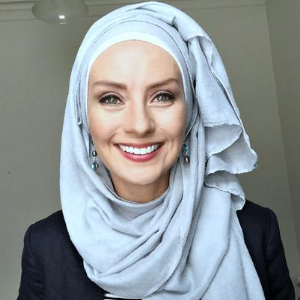
Rabia Chaudry
We will emerge and be more humble in understanding our place on this planet.
Human beings have long forgotten their own vulnerability and interconnectedness with people in other parts of the world—with nature and with the elements. We have become consumers of everything and anything to satisfy our desires, mindless of the toll our consumption takes on the earth, wrecking the balances that should keep us in check, and disrespecting the needs of the planet and creatures we share it with. But this pandemic teaches us that we cannot and do not operate in silos—that our individual decisions have global impacts, and yet we are but a small part in a worldwide community.
We have already begun to put the collective good over the individual desire, and we will emerge and find a better way.
Rabia Chaudry is an attorney, advocate, and New York Times bestselling author of the critically acclaimed book Adnan’s Story. She is also the cohost and coproducer of the investigative wrongful conviction podcast “Undisclosed” and the weekly political podcast “The 45th.”
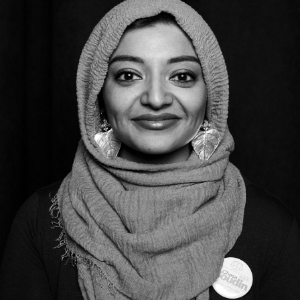
Val Demings
We will emerge and be our brothers’ keepers.
Dr. King said, “In a real sense, all life is interrelated. All people are caught in an inescapable network of mutuality.” America is known for our independent streak. Yet, we have met this pandemic with one of the greatest acts of collective American solidarity that I can recall in my lifetime. Hundreds of millions of people have made remarkable changes in their own lives to save the lives of others. COVID-19 has illuminated the connections between each of us, and I know that our willingness to look out for each other will carry us through this tragic time.
U.S. Representative Val Demings is a former social worker and police officer who rose to serve as Orlando’s first female chief of police. She was elected to Congress in 2016, proudly representing Florida’s 10th District, and rides her Harley-Davidson in her limited spare time.
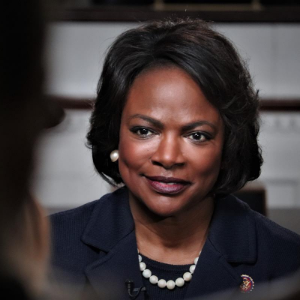

Negin Farsad
We will emerge and be better at talking to strangers.
I know, I know, we tell children not to talk to strangers, but after all this let’s definitely talk to strangers! (In a safe way!) Even before the pandemic, we were seeing an epidemic of loneliness. More and more people are living alone; more and more people don’t or can’t find partners; more and more people are citing loneliness as a major factor in their unhappiness. The problem is so pervasive, the U.K. has a Minister of Loneliness, for Chrissake!
We’ve been living in our sociopolitical silos, our internet silos—we’ve been binging on the couch instead of going out into the world. Of course, we can’t go out when a global pandemic is Earth’s new roommate. But when this is done, we’ll finally be so tired of being in our silos that we’ll branch out! We’ll make eye contact with our neighbors, we’ll ask how they’re doing, we’ll say “what’s up” to the clerk at the bodega and we’ll mean it. We’ll have conversations about the weather; we’ll have a laugh about the Knicks—small talk will make our hearts sing! We’ll put the internet aside and celebrate with people. It’ll be the Roaring Twenties indeed! I can’t wait to meet all the strangers this pandemic has kept from me.
We will emerge and find a better way.
Negin Farsad is a comedian, actor, and host of the podcast “Fake the Nation.” She is a regular on NPR’s Wait Wait… Don’t Tell Me, as well as a columnist for The Progressive magazine. Her TED Talk has been seen by millions. @NeginFarsad
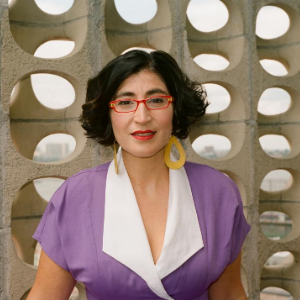
Photo by The Standard
Kim Ghattas
We will emerge and be more humble.
We will emerge and be more humble, more equal, more connected, more resilient, more global.
If we are more humble, we will accept that a six-figure salary does not protect us from death. We will understand we are just as worthy as a single mom of three in Alabama, equal in the face of a global pandemic. If we accept that we are equal, we can connect the dots between the indentured worker in Pakistan to the delivery worker in NYC to the teacher in Singapore, on the global matrix of resilience—the kind of resilience that does not fall prey to complacency.
A flurry of books and articles in recent years hailed the fact that we were living in a world that was better than ever, in the best time that humanity had ever witnessed: Global indicators for poverty and child mortality were down, literacy and life expectancy was up. It was all true. But the conviction that if things have been improving then they will continue to improve, that the gains made were irreversible—that conviction made us complacent, blind to the fragility of it all, blind even to the continued inequities within these improved indicators. All the fault lines have now been exposed, many of the gains wiped out. Not since WWII has humanity been united in a shared experience—one single event that rippled across all borders, impacting each country differently with more or less ferocity. So let us emerge from this pandemic and be truly global in our efforts to be more resilient, more connected, more equal, more humble.
We will emerge and find a better way.
Kim Ghattas is a Carnegie Endowment scholar, a former journalist, and author of two books— most recently Black Wave: Saudi Arabia, Iran and the Forty Year Rivalry that Unraveled Culture, Religion and Collective Memory in the Middle East. After a decade in D.C., she’s spending time back home in Beirut. She is on Twitter at @KimGhattas.
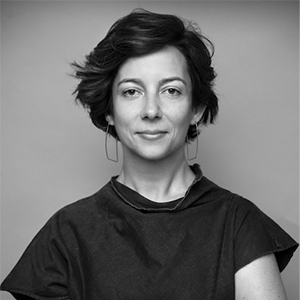
Virginia Heffernan
We will emerge quieter.
Four years ago, America failed decisively to live up to its ideals. Since then, it has failed to live up to its responsibilities, its Constitution, its criminal laws. Now, it is simply failing to live. America is now failing at survival. Our leadership and its supporters have become enchanted with death. Our country has turned counteradaptive.
But when there is any poetry left in a land, there is mourning after death. Man, the nationwide shiva is quiet—the stuff of shrouds, tombs, earth, breezes, cold stars, and ashes. My family now mourns the death of my Aunt Peg, on Easter weekend 2020, from COVID-19. On April 19, my five cousins, unembraced, held a rope made of their mother’s scarves and stood six feet apart in a circle beside Hood Pond in Topsfield, Massachusetts.
They were very quiet. Whatever deafening spite persisted on the internet and in the president’s clamor over what had happened to us—clamor that ensured it would keep happening—it seemed far away from Hood Pond. We will all emerge quiet, too, mourning for all the aunts and for all the ideals.
Virginia Heffernan is a columnist at the Los Angeles Times and WIRED, and the host of Slate’s “Trumpcast.” She’s also the author of Magic and Loss: The Internet as Art. Twitter: @page88
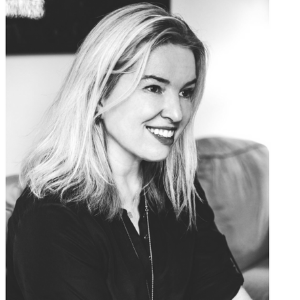

Ishmael Hope
We will emerge and watch opera,
host potlatches, complete
rites for the dead,
put on avant-garde exhibitions, stage
happenings.
We will give long hugs,
sing karaoke
after the night’s reading, mingle
romance with art, make bold statements
and lots of babies.
We will figure a way out of this,
listen to Elders, learn languages,
reweave the symbiosis
that webs
the sliver of geology we briefly occupy.
We will hold
and hold, and
hold
the rings of the oldest tree,
the bear’s den where the bear is sleeping
and hearing everything,
and the dreams that we came to be
from what the land told us.
We will emerge
and find a better way.
Ishmael Angaluuk Hope (Tlingit, Inupiaq), proudly named after and inspired by the great Black intellectual Ishmael Reed, explores and illuminates Indigenous sovereignty through his art and Indigenous critical theory. He lives, creates literary art, and raises a family of five children with his wife Lily Hope, a Tlingit weaver, in Dzantik’ihéeni (or Juneau, Alaska).

Rabbi Jill Jacobs
We will emerge and be more responsible for one another.
The United States holds tight to a myth of rugged individualism—that every one of us should be able to go it alone, without support from our government, and without a sense of collective responsibility for others. This ideal has always been an impossibility—we do not all have equal opportunity or access, and none of us who achieves economic success does so alone.
The Talmud teaches that the divine presence rests on even a single person engaged in sacred practice. But when a community of 10 gather, the divine presence is already there, waiting for them. In Judaism, certain ritual practices demand such a group of 10—a reminder that we all need a community to hold us up, especially in moments of intense joy or of grief.
The COVID-19 pandemic has exposed the fallacy of the belief in individualism. We see more clearly than ever before that we are inextricably connected to one another. This must lead us to taking communal responsibility for one another and to building systems that ensure the health, dignity, and safety of all of us.
We will emerge and find a better way.
Rabbi Jill Jacobs is the executive director of T’ruah: The Rabbinic Call for Human Rights, which trains and mobilizes more than 2,000 rabbis and cantors, together with their communities, to advance human rights in North America, Israel, and the occupied Palestinian territories. She is the author of There Shall Be No Needy and Where Justice Dwells, two books on Judaism and social justice.
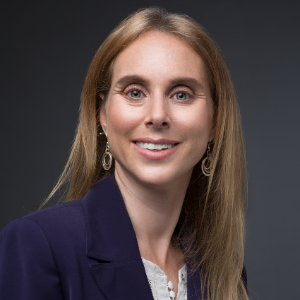
Min Jin Lee
We will emerge and
be heartbroken at those we have lost,
lament the lost opportunities,
acknowledge the inequities of our world,
innovate,
solve new problems,
prepare better,
create a new world order,
love one another, and
find a better way. We can emerge.
Min Jin Lee is the author of Free Food for Millionaires and Pachinko, a National Book Award Finalist. She is a writer-in-residence at Amherst College.
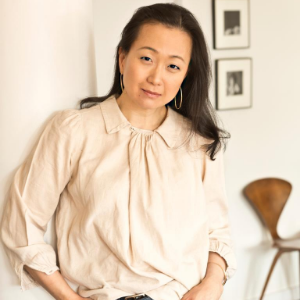
Photo by Elena Seibert

Rev. Jacqui Lewis
We will emerge and be a healthier, more loving, generous and just global family.
We will have developed antibodies to hatred, racism, sexism, and xenophobia. We will have flattened the curve of bigotry, greed, and violence because we have been forced into this “timeout.” We will gratefully fling open the doors of our residences and the doors of our hearts and let light and love flood in. We will see more clearly how much our liberation is tied together; the truth of ongoing injustice will free us to dream of a new world in which everyone has enough. We will no longer retreat to our tribes, but in the spirit of Ubuntu, we will claim in one voice, “I am who I am because we are who we are. I see you and your unique, beautiful humanity. You see me and mine; we are in this together!”
We will emerge and find a better way.
The Rev. Dr. Jacqueline J. Lewis—an activist and public theologian—is senior minister at Middle Collegiate Church in Manhattan. Lewis leads her welcoming, artistic, multi-everything congregation to work for racial, gender, economic and LGBTQIA equality, and against gun violence, preaching “Love God, Neighbor, and Self; Love. Period. Everything else is commentary.”
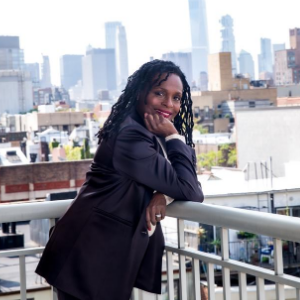
David Lindsay-Abaire
We will emerge and be more huggy. Even if we weren’t really huggers before.
We’ll embrace neighbors—the people we would’ve maybe given a polite wave to before all this, we’ll wrap our arms around them and give a hearty squeeze and ask how they’ve been. We’ll hug our children a little harder than we used to. And, yes, they’ll still say, “Ew, stop. Seriously, stop that, I’m on the phone,” but they’ll mean it a little less than they once did. We might also hug strangers. But only if we get permission first. And sure, that might be a little awkward—hugging a stranger in the subway or at the supermarket or in the middle of a crosswalk—but hey, who won’t need a hug after all this?
We will emerge and find a better way.
David Lindsay-Abaire is a Pulitzer Prize-winning playwright, screenwriter, lyricist, and librettist.
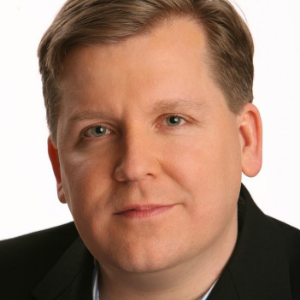
Lynn Nottage
We will emerge and be more mindful.
Perhaps, isolation and deprivation will reinforce the value of community in a more expansive and inclusionary way. We’ll understand that a healthy society means more than being virus-free, but extends to mindfully caring for each other with equanimity and compassion, regardless of geography, race, class, or gender identity.
Perhaps, this forced shift in perspective will allow us to view the world from a new vantage point, allowing us to see the dust and mold collecting in the unattended corners of our humanity.
We will emerge and find a better way.
Lynn Nottage is a playwright and a screenwriter. She is the first, and remains the only, woman to have won the Pulitzer Prize for Drama twice. Her plays have been produced widely in the United States and throughout the world.
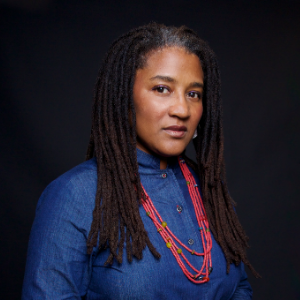
Photo by Lynn Savarese

Naomi Shihab Nye
We will emerge and our span of constant care be wider.
Every Californian as precious as every New Yorker, every Palestinian as every Israeli.
Each person with piled grocery cart under the bridge as every mansion dweller.
Every voice, every name, equal tenderness.
The walls can never have a final say.
We will emerge and find a better way.
Naomi Shihab Nye is the Young People’s Poet Laureate of the United States (Poetry Foundation).
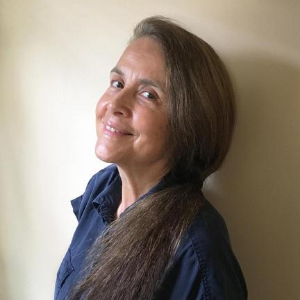
Photo by Michael Nye
Edna O’Brien
We will emerge and extend our circle of compassion.
When all the deaths, the images of the dying, and the corpses in refrigerated trucks are gone from our screens, what will it have done to us as individuals? Will we be truer to ourselves and others? Will we be less ego-driven, less entrenched in our own self-importance? Will we remember the wisdom of Albert Schweitzer, who said, “Until he extends his circle of compassion to include all living things, man will not himself find peace”?
We will emerge and find a better way.
Edna O’Brien has written more than 25 works of fiction, including The Little Red Chairs and The Light of Evening. She is the recipient of numerous awards, including the PEN/Nabokov Award for Achievement in International Literature, the Irish PEN Lifetime Achievement Award, the National Arts Club Medal of Honor, and the Ulysses Medal. Born and raised in the west of Ireland, she has lived in London for many years.
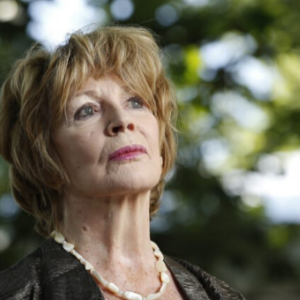
April Reign
We will emerge and be more thoughtful.
Too often, we all live in our own bubble. “If it doesn’t affect me, why should I care?” “I care, but I’ve got too much going on to actually do anything.” “I want to help, but I don’t know where to start.” “I’m just one person; what difference can I possibly make?” All of these messages are not only self-defeating, but they prevent us from moving forward as a global community.
What we know is that everyone can do something. Sometimes, it’s recalibrating how we usually operate to find new ways of moving in the world. We’ve seen this on a large scale as everyone from fashion designers to Fortune 500 corporations respond to the pandemic in ways that are novel and forward-thinking. As individuals, we can do this, too. We all should use this time to investigate ways that a seemingly small but significant change can make a difference in our own lives and in the lives of others.
We will emerge and find a better way.
April Reign is the creator of #OscarsSoWhite, and a diversity and inclusion advocate. @ReignOfApril
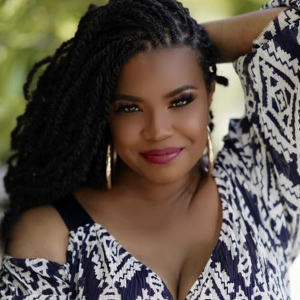

Zainab Salbi
We will emerge and be more kind.
For too long now, fear and anger have been leading the way we talk to each other in our politics, in our activism, and in our news coverage. We have gotten so used to pointing the finger at each other in blame and judgment.
Poetic it is that the killer of the moment is an unseen virus in the air. It gives us no enemy to hate, to bomb, and to demonize. It has no religion nor race, class, or gender. It sees us all as one, and we can only be defeated through oneness in our actions and plans.
In moments where life and death brush against each other, all else pauses, and kindness is what gets remembered the most. The touch of a nurse, a call from a friend, and a look of a doctor’s eyes become a healing nectar to an ailing soul—and these days, an ailing world.
What if we emerge out of this crisis carrying this kindness around—in the ways we act and talk to each other across all our divides—to friends and foes alike? After all, a kind word is more powerful than a million shouts to bridge across all divides.
Zainab Salbi is an Iraqi American humanitarian and women’s rights activist. She is the founder of Women for Women International and the author of several books, including her latest, Freedom is an Inside Job.
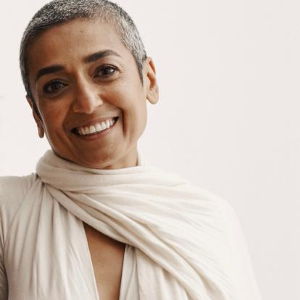
Brandon Stosuy
We will emerge unplugged, and yet better connected.
One thing I noticed at first in quarantine, with all of us working and schooling from home, is that I, along with my wife and my kids, started making meals and baking together more often; we’d take walks and read together. We’d depend on the internet for work, but we were around each other all day, every day, and we kept finding new things to do offline. And, my father, stepmother, and I would talk on the phone and FaceTime regularly, something we rarely did before. We celebrated Russian Easter together, something we hadn’t done in years. It was virtual, but we were together, and when we showed my father the colored eggs we’d made—the traditional way, by soaking them in beet juice—his eyes teared. I still know more about my father’s day-to-day life since being separated than I did when we had the freedom to come together.
I started seeing this happening in all areas of my life: There are now people from my office, who I used to walk past and barely nod hello to, who I have come to know better via Zoom, where you look someone directly in the eye. Before this, in meetings we’d attend in the same room, everyone was looking away to their phones, distracted. Now, they tell me when they’re feeling anxiety or aren’t feeling well, when the sound of ambulances gets to be too much, and we laugh together, too.
I’ve noticed, too, how quickly we’ve been willing to break out of quarantine, and to keep our masks on, while demonstrating in the street. We’d all gotten so used to social distancing, or at least accepted it, and then when we needed to come together, it happened immediately—like that. When the people I hadn’t known well—and now know better—would leave work early to protest, or tell us they needed to log off early because they couldn’t take it anymore, or shared a story about a run-in with the police, I thought about how we never shared these details before. Now, we do.
When alone, I’ve taken to sitting on my back porch, drinking coffee and listening to the birds sing. Even with everything else going on, it brings me calm, and I’ve been able to better identify each bird as quarantine continues. For instance, a mating pair of cardinals who never go away from our tiny backyard for very long. Everyday at 2pm, when I imagine she sees her reflection in our back window, the female cardinal comes and pecks on the glass. She’s fighting away an imagined intruder, but it feels like she’s knocking to remind me to keep looking outside, looking into the eyes of others, engaging in conversations, teaching my kids about why people are walking the streets with signs over their heads, and remembering to break bread and slow down, even after this is over. I let her keep knocking, and it does remind me.
We will emerge and find a better way.
Brandon Stosuy is the cofounder and editor-in-chief of The Creative Independent and co-founded and co-curates the annual music, book, and arts festival, Basilica Soundscape. He’s the author of two children’s books, Music Is (2016) and We Are Music (2018), both published by Simon & Schuster, and is at work on a three-part journal and memoir series about work/life balance, inspiration, and failure, the first volume of which is being published by Abrams Image in September 2020. Twitter: @brandonstosuy
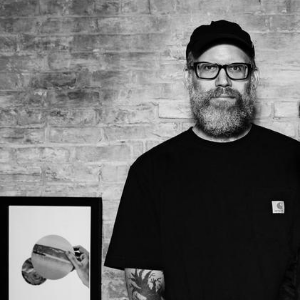
Photo by Samantha Marble
Jake Tapper
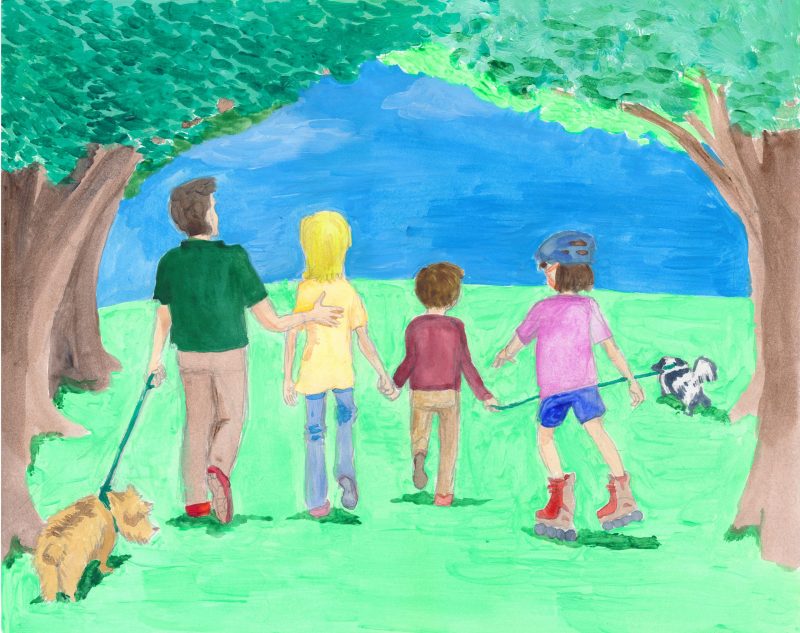
CNN anchor and chief Washington correspondent Jake Tapper joined the network in January 2013. Tapper currently anchors a one-hour weekday program, The Lead with Jake Tapper, which debuted in March 2013, and has hosted CNN’s Sunday morning show, State of the Union, since June 2015. Tapper imparts his political expertise on State of the Union by conducting interviews with top newsmakers on politics and policy, covering Washington, the country, and the world. The Lead covers headlines from around the country and the globe with topics ranging from breaking news in politics and world events, to politics, money, sports, and popular culture.
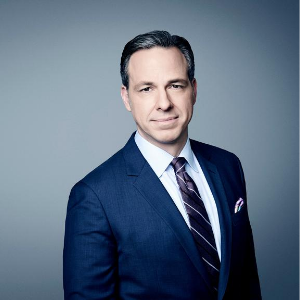

Baratunde Thurston
We will emerge and be powerful together.
It has taken a once-in-a-century pandemic for some to realize the value of looking out for the collective. While there is much we can accomplish as individuals, especially those of us born with advantages, there is clearly value to coordinated action and pooling of resources.
Those of us who have been taught that the best government is no government have now seen what it looks like for the central government to abdicate its responsibilities to protect and defend its people. We have also seen what it looks like for people to fill that void, self-organize, and look out for each other. For the common good. For us.
We will remember that together we are capable of much more than we are alone.
We will emerge and find a better way.
Baratunde Thurston is an Emmy-nominated host who has worked for The Onion, produced for The Daily Show, advised the Obama White House, and cleaned bathrooms to pay for his Harvard education. He wrote the New York Times bestseller How to Be Black, and his TED talk, “How to deconstruct racism, one headline at a time,” has been called one of the greatest of all time by NBC’s Brian Williams.
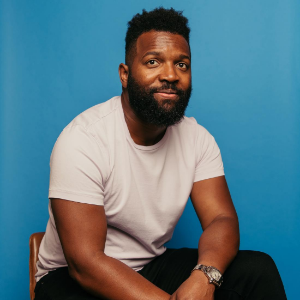
Sarah Wildman
We will emerge and become a more aware nation.
The shuttering of American schools, businesses, restaurants, and gyms was not just a mass virus prevention effort. It was a nationwide social experiment. In being asked to see—and to care for—not just ourselves, but our neighbors, we are forced to recognize that our lack of a social safety net and overtaxed medical system leaves the already vulnerable terrifyingly exposed. #StayHome, then, is a call to human decency—an ask for us all to consider one another, even at the expense of our own temporary discomfort. A mask is a powerful expression of care, shared responsibility as an art form. It is also, it turns out, a form of leadership. We have not always risen to its basic call.
And then, in the midst of that call to quiet duty, there came a moment of long overdue recognition. The Talmudic and Mishnaic dictum is, to save one life is to save an entire world. With the killings of George Floyd, Breonna Taylor, Ahmaud Arbery, and Elijah McClain, the scores of other Black and Brown men and women who have lost their lives before them—all those worlds lost, and all those we stand to lose—became painfully more visible both here and around the world. For some, it was an awakening; for all too many others, it was the terribly delayed visibility of a long-lived reality. “Say their names” became a mantra. Justice became synonymous with Black Lives Matter, with the freedom to breathe. Widespread support for anti-racist protest signaled a fulcrum moment. There is still so much work to be done.
As the future looms uncertain, and as states continue to see virus and death numbers climbing, the most vulnerable among us remain at risk. What if we face the overlapping challenges in front of us and recognize that our highest national goal is not only to care for oneself and family, but to understand that a society is only as strong as how we care for the most vulnerable, to love our neighbor as ourselves? What if we were to recognize that it is not simply enough to feed children who are hungry at school, but that we must root out the causes of mass food insecurity so that those children’s bellies remain full inside of school and out? What if we are to see that those among us most vulnerable to the pandemic are not an afterthought, not a statistical anomaly, but an essential part of us all?
What if we took it upon ourselves to care for those around us, those we know, and those we do not know? What if we do not engage in tokenism, but revel in the richness of a society that celebrates its diversity, that uplifts the voices too long unsung?
And then, what if we took it upon ourselves to continue to care for those around us? What if we emerge and discover shared responsibility makes us stronger? What if we teach that supporting lives means amplifying the voices too long overlooked, suppressed, underrepresented? What if we learn to really see one another? Can visibility bring redemption?
We will emerge and find a better way.
Sarah Wildman is a journalist, editor, podcast host, and the author of Paper Love: Searching for the Girl My Grandfather Left Behind. Twitter: @SarahAWildman
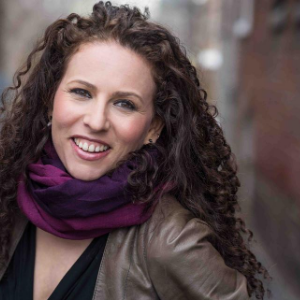
Photo by Kate Warren
Rafia Zakaria
We will emerge and be closer to our families—whether they are the ones we are born with or those that we create.
So much of American life as it was is based on an individualist pursuit of this or that. We move for jobs, we move for college, we move at the drop of a hat not quite estimating the cost of distance on our inner lives and on our sense of inner fulfillment. I hope that there will be a rearrangement of our lives in which it is easier to be close to the people that mean the most to us. I hope that we begin to evaluate constant travel and constant movement not only in economic terms, but also in terms of the spiritual and psychological costs on ourselves and our dear ones.
We will emerge and find a better way.
Rafia Zakaria is the author of The Upstairs Wife: An Intimate History of Pakistan (2015) and Against White Feminism: Notes on Disruption (2021) She is a columnist for Dawn (Pakistan) and writes the Alienated column at The Baffler.
